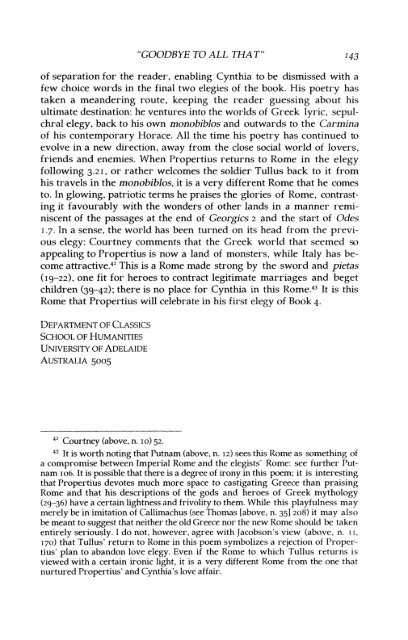OUSEION - Memorial University's Digital Archives Initiative ...
OUSEION - Memorial University's Digital Archives Initiative ...
OUSEION - Memorial University's Digital Archives Initiative ...
You also want an ePaper? Increase the reach of your titles
YUMPU automatically turns print PDFs into web optimized ePapers that Google loves.
"GOODBYE TO ALL THA T" I43<br />
of separation for the reader. enabling Cynthia to be dismissed with a<br />
few choice words in the final two elegies of the book. His poetry has<br />
taken a meandering route. keeping the reader guessing about his<br />
ultimate destination: he ventures into the worlds of Greek lyric. sepulchral<br />
elegy. back to his own monobiblos and outwards to the Carmina<br />
of his contemporary Horace. All the time his poetry has continued to<br />
evolve in a new direction. away from the close social world of lovers.<br />
friends and enemies. When Propertius returns to Rome in the elegy<br />
following 3.21. or rather welcomes the soldier Tullus back to it from<br />
his travels in the monobiblos. it is a very different Rome that he comes<br />
to. In glowing. patriotic terms he praises the glories of Rome. contrasting<br />
it favourably with the wonders of other lands in a manner reminiscent<br />
of the passages at the end of Georgics 2 and the start of Odes<br />
1.7. In a sense. the world has been turned on its head from the previous<br />
elegy: Courtney comments that the Greek world that seemed so<br />
appealing to Propertius is now a land of monsters. while Italy has become<br />
attractiveY This is a Rome made strong by the sword and pietas<br />
(19-22). one fit for heroes to contract legitimate marriages and beget<br />
children (39-42); there is no place for Cynthia in this Rome. 43 It is this<br />
Rome that Propertius will celebrate in his first elegy of Book 4.<br />
DEPARTMENT OF CLASSICS<br />
SCHOOL OF HUMANITIES<br />
UNIVERSITY OF ADELAIDE<br />
AUSTRALIA 5005<br />
42 Courtney (above. n. 10) 52.<br />
43 It is worth noting that Putnam (above. n. 12) sees this Rome as something of<br />
a compromise between Imperial Rome and the elegists' Rome: see further Putnam<br />
106. It is possible that there is a degree of irony in this poem: it is interesting<br />
that Propertius devotes much more space to castigating Greece than praising<br />
Rome and that his descriptions of the gods and heroes of Greek mythology<br />
(29-36) have a certain lightness and frivolity to them. While this playfulness may<br />
merely be in imitation of Callimachus (see Thomas [above, n. 351 208) it may also<br />
be meant to suggest that neither the old Greece nor the new Rome should be taken<br />
entirely seriously. [ do not, however, agree with Jacobson's view (above. n. I I,<br />
170) that Tullus' return to Rome in this poem symbolizes a rejection of Propertius'<br />
plan to abandon love elegy. Even if the Rome to which Tullus returns is<br />
viewed with a certain ironic light. it is a very different Rome from the one that<br />
nurtured Propertius' and Cynthia's love affair.

















